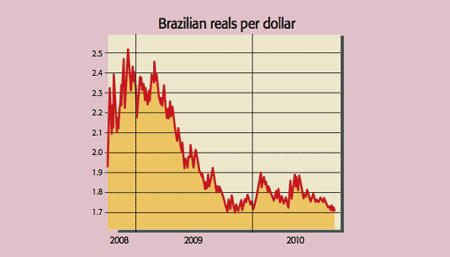
“We’re in the midst of a global currency war,” said Brazil’s finance minister Guido Mantegna this week. He was articulating what no policy-maker has yet publicly admitted: that more and more countries are resorting to intervention in the foreign-exchange market to weaken their currencies and make them more competitive. Japan stepped in to weaken the yen for the first time in six years a fortnight ago, following recent Swiss efforts. Several east Asian countries including South Korea and Taiwan have sold their currencies, and Brazil has given its sovereign-wealth fund authority to sell the real, which has soared against the US dollar over the past two years.
The long-running currency dispute between America and China has also intensified over the past few days. Frustrated by the miniscule rise in the yuan since it was unpegged from the dollar in June, Congress is considering a bill imposing duties on goods deemed unfairly cheap. China has slapped a higher tariff on US poultry.
What the commentators said
“The list of enthusiastic devaluers is long enough to stir up a global fight,” said Lex in the FT. The trend is growing because governments in industrialised countries, frustrated by the slow pace of economic recovery, want a boost from exports. Emerging states want to keep their own export growth going and “see rich countries unfairly using currencies to slow down their relative geopolitical decline”. And as global growth appears to be fading, the urge to underpin exports increases, said Ian Stannard of BNP Paribas. Brazil has seen Asia intervene and “feels it can’t stand idly by”.
In the US and Britain, where direct intervention is “anathema”, as Capital Economics put it, a weaker currency looks likely to be an indirect result of more quantitative easing (QE). Money printing suggests interest rates will be lower for longer and will fuel fears of eventual inflation. Adam Posen, a member of the Bank of England monetary policy committee, this week called for more QE immediately, which was “strong stuff”, said Nils Pratley in The Guardian. It’s rare for a speech to cause sterling to fall by around a cent against the dollar.
Don’t count on tensions easing after the G20 summit in Seoul next month, said David Prosser in The Independent. The US had hoped to put multilateral pressure on China to allow the yuan to float more freely, but with many states now “copying China’s lead”, this looks impossible.If domestic demand stays depressed, countries in the developed world that don’t manipulate their currencies will be tempted to slap tariffs and quotas on countries they consider currency cheats, which could start a trade war. “A world of beggar-my-neighbour policy,” said Martin Wolf in the FT, “is most unlikely to end well.” That would be good for gold.